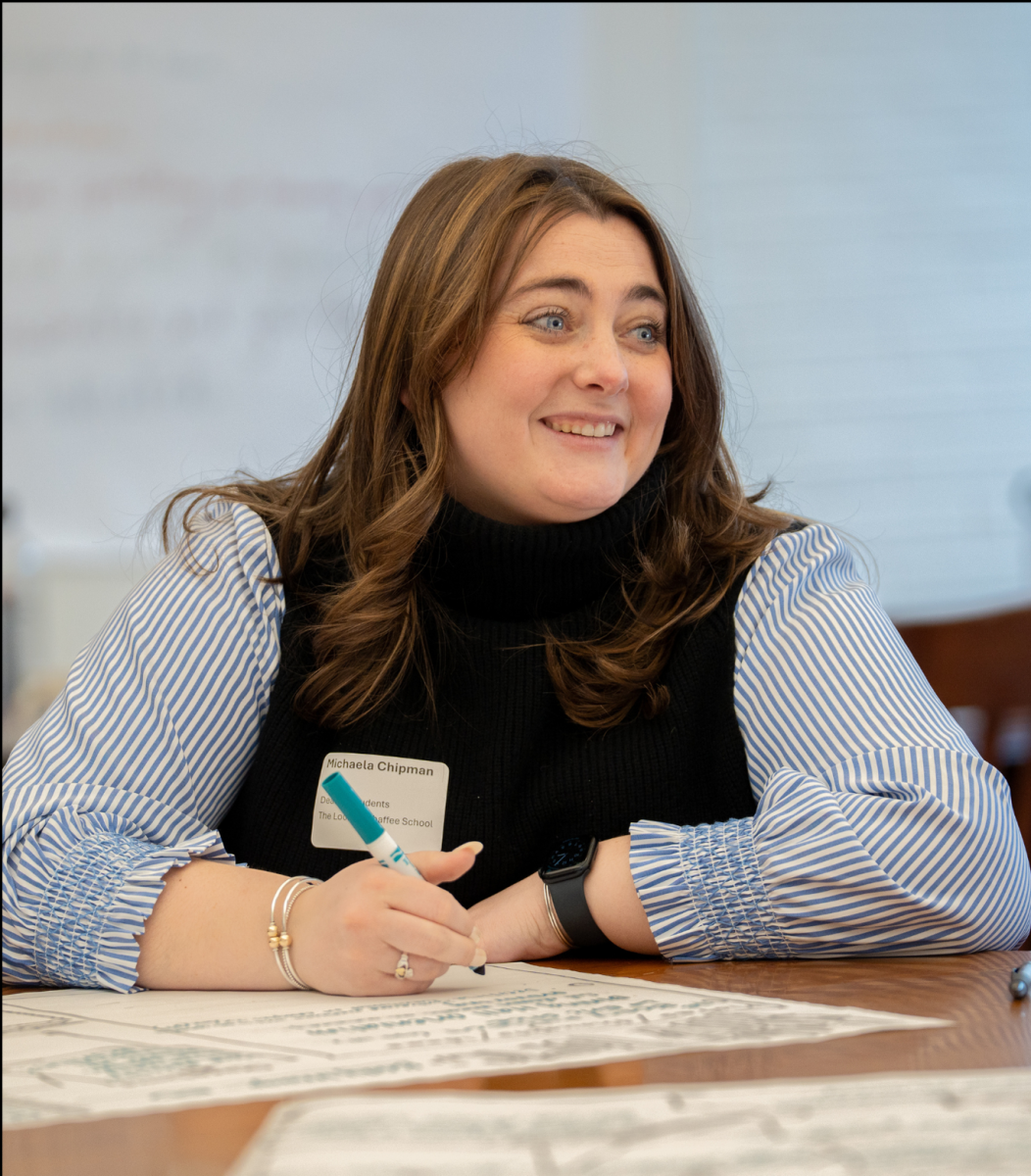Mrs. Lori Caligiuri: Empathetic Non-Partisan in the Classroom
Mrs. Lori Caligiuri smiles into the camera.
April 10, 2022
In her tenth year at Loomis Chaffee, History, Philosophy & Religious Studies faculty member Mrs. Lori Caligiuri strolls to class wearing a pearl necklace and holding a can of Diet Coke or grapefruit citrus Fresca in her hand. For most of her Loomis career, she has taught American history, including both the regular level and college level courses.
Currently, she teaches four sections of CL US History and has never stopped loving it. She enjoys teaching American history as a story and helping students see historical figures as real people.
“They’re living, breathing people with all the foibles and anxieties we have today. When we can look at these figures in that way, we can understand them better,” she said.
When discussing her teaching style, she often mentioned the word “relational,” a description most students would agree with. She emphasizes developing relationships with students and gaining their trust. Her students, like Dora Lin ’23, who described her as “angel-like,” recognize her deep understanding of them.
Mrs. Caligiuri mentioned that her experience as an LC parent may be the root of her empathy. With two kids, one who graduated Loomis and one who still attends the school, she believes her children have helped her understand the emotional well-being of a student.
“It makes me a little bit more sympathetic in terms of overall workload and when things are being assigned,” she said.
Another reason for her successful teaching style comes from her non-partisan role in the classroom. While she involves herself with conservative outlets as the faculty advisor of LC Young Republicans alongside Mr. Jake Smith, Associate Director of Admission, she doesn’t bring her political opinions to class. In fact, she showcases both sides, or sometimes even more, to the classroom frequently, showing interviews with Bernie Sanders, teaching an Eric Foner textbook, and assigning a W.E.B. Du Bois assignment.
She describes one of her missions as not trying to infuse her own beliefs into the class. Growing up, she encountered teachers that were very partisan and political.
“I remember times I felt like I couldn’t share my own beliefs in the classroom,” she said, referring to her life as a student.
She says that she wants to keep the classroom and teach in a “neutral” way.
“I like the word neutral because it goes beyond politics. I don’t really think it matters how I feel about things,” she said.
She believes that keeping her own beliefs out of the room helps students develop their skills as history students as well.
“I see my role as trying to help students build arguments, understand evidence, and research topics. In many ways, the best arguments come from looking at both sides, so it would be a disservice to only present one side to the students,” she said.
In addition, she’s pleased with the current history department and agrees with the emphasis on looking at history through an equitable lens. She disagrees with the political tensions of the word “equity.”
“I don’t think that an equitable narrative is conservative or liberal,” she said.
She believes that bringing history into the classroom as a story that includes everybody shouldn’t represent strictly anti-conservative values or anti-liberal values. She hopes that the phrase “an equitable narrative” doesn’t seem like a buzzword that’s loaded with lip service but rather an accurate representation of learning history.
She also discussed the negative light that’s often shed on conservatism on campus. She believes that recently conservatism has been “wrapped up with very nasty adjectives,” which has been one of the things that has been bothering her the most.
She then shared anecdotes of students telling her that they were uncomfortable identifying as conservative due to the fear of backlash, and she’s concerned that the negative light on conservatism will make it harder for students to express themselves, perhaps similar to her life as a young academic afraid to share her views.
She further contends that conservatism is not hatred, even though the ideology has often been negatively looked upon recently.
“I wouldn’t be associated with a party of hate. I would never do that,” she said.
She hopes to have more bipartisan conversations in which people with different ideologies can discuss and contend with each other’s ideas.
“The basis is that intellectual people on both sides of the aisle can disagree about issues,” she said.









